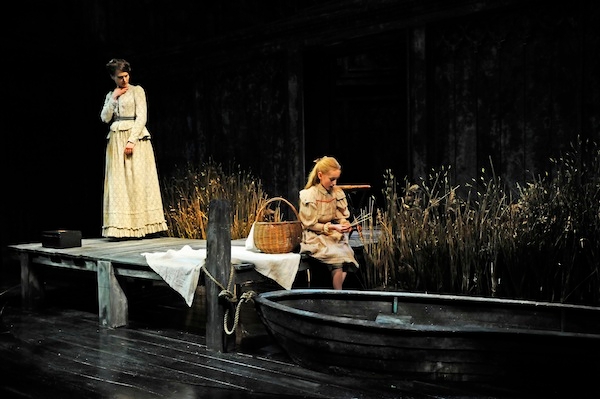A triple thick dose of chicklit at Hampstead. Amelia Bullmore’s good-natured comedy has three girls sharing a student house in 1983. Those were the days. Back then we received ‘grants’ to attend university, i.e., we were paid to look occupied, like job-seekers and politicians. I’m glad to report that Bullmore accurately evokes the culture and language of the time. Just a couple of blunders. We didn’t say ‘PJs’ to mean pyjamas. And ‘what is she like?’, to express affectionate exasperation, didn’t arrive till the 1990s. The girls don’t smoke, nor do they mention Greenham, which is odd, but the play wishes to focus on their emotional and professional development.
The three are nicely drawn and convincingly played: there’s the chilly feminist (Gina McKee), the tough lesbian (Tamzin Outh-waite) and the motherly nymphomaniac (Anna Maxwell Martin). Tragedy and joy are doled out with the random heartlessness of real life and with no regard to personal merit. The nympho gets pregnant, the feminist lands a plum job in New York and the lesbian is raped at knifepoint. After college they scatter apart, and keep in touch fitfully.
Then one of the girls is killed in a car smash. This knocks the stuffing out of the play and costs it much fun and warmth. A big mistake. The surviving pair spend the final half-hour swapping catty, humourless speeches about their lost sister. These rancourous exchanges ring false because the girls are, after all, merely old friends, not married partners or apostles of some barmy cult devoted to their past. That aside, the play succeeds on its own terms, and director Anna Mackmin matches the script’s ambitions and delivers a big, golden-hearted girlie soap opera.
Hampstead Theatre, under Ed Hall’s management, has rediscovered its talent for finding West End hits. Could this be next? Ideally, the nympho, played by Anna Maxwell Martin, should be performed by a household name but she’s unlikely to get the boot. Impresarios, to their credit, are loth to tinker with a settled cast in order to protect their financial investment. If it transfers, it’ll be a hit with half the populace. And here’s my note of caution. Women will embrace this show with the unthinking adoration they lavish on jewellery, puppies and their husbands following a pay rise. Men will be less riveted. So if the missus suggests this as a night out, tell her to take a girlfriend while you stay at home and enjoy a pint of brandy and a snooze.
Talking of which, Henry James has cured more insomniacs than any writer living or dead. The Turn of the Screw is the James work I know best: I got as far as page seven before slipping into a coma. When I start a sentence I like to think that I’ll finish it before I qualify for a pension. James offers no such assurance. His spooling subclauses spread out and multiply like deadly germs breeding under a microscope.
The story concerns a dim, nervous governess arriving at an ugly pile with pointy turrets and spooky casements. We soon learn that the previous governess and her lover died in mysterious circumstances and their ghosts keep popping up all over the place, in the window frame, on the roof, under the bed-sheets, in the window frame again. In some half-explained way, the ghosts wield power over the children in the governess’s charge. It scarcely matters that this is left obscure because all the show’s parts are subordinated to the conventions of horror. I’m not a big fan, I have to admit.
The deal appears to be that the producer reserves the right to inflict two forms of unpleasantness on you. A nasty shock when you aren’t expecting it or an agonising longueur while the next nasty shock is delayed and delayed so as to minimise your ability to receive it with equanimity. Hard to call this entertainment. ‘Look. Two baths full of water. One scalding, one freezing. Jump in and see which is which.’ Hard to call it art either. Jolts to the nervous system teach you nothing other than that your reflexes are functioning. The animal, rather than the human, is summoned forth. The total effect of the show could be reproduced by usherettes touching random play-goers with cattle prods. The absence of emotional or psychological interest holds for the tepid, twitchy governess too. Beautiful Anna Madeley has a striking face, full of sensitivity and ruthlessness, and she should be stretching herself with Lady Macbeth rather than dragging around in a boring old skirt playing this awkward convergence of neurosis and bafflement. My tip: brandy and a snooze.







Comments